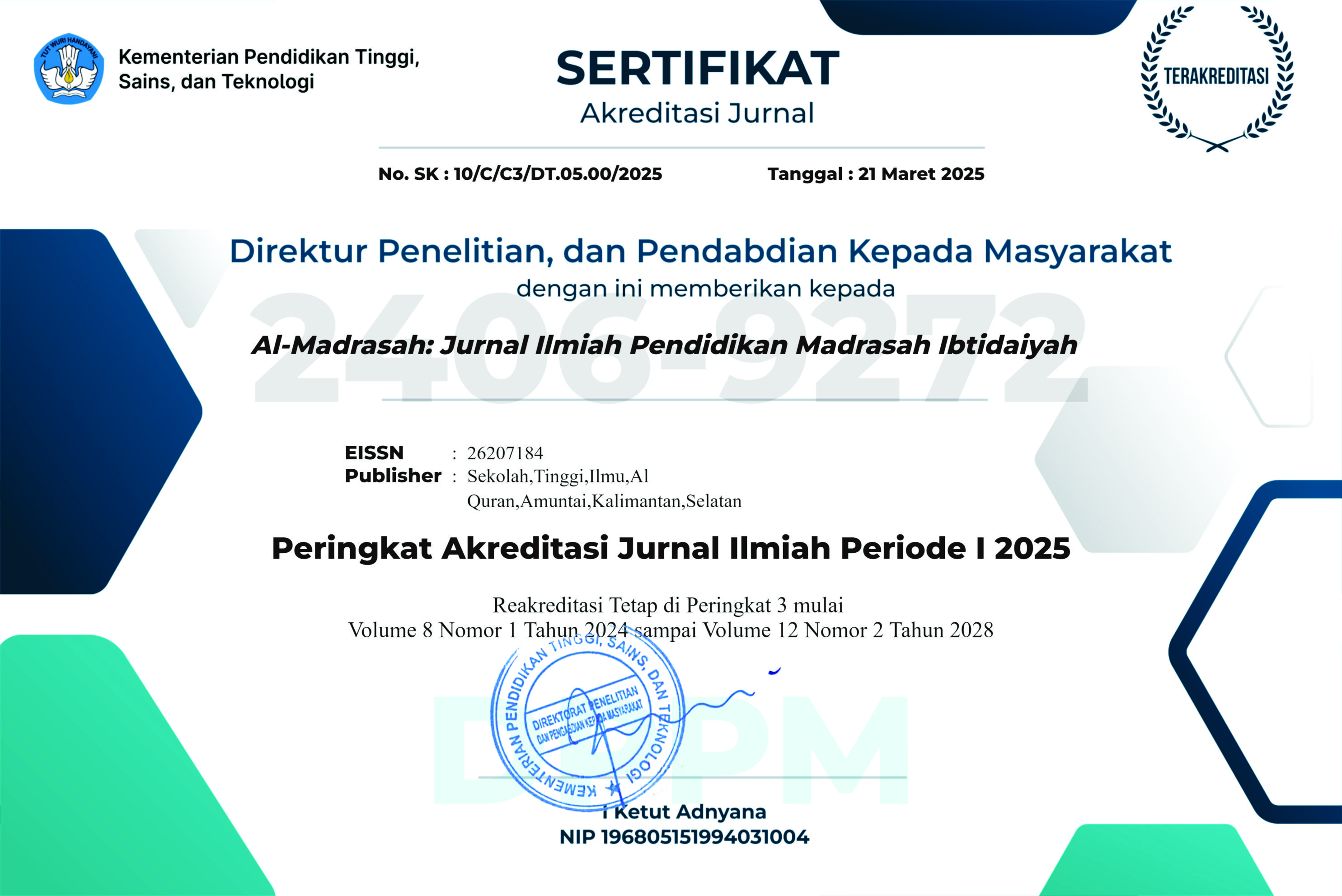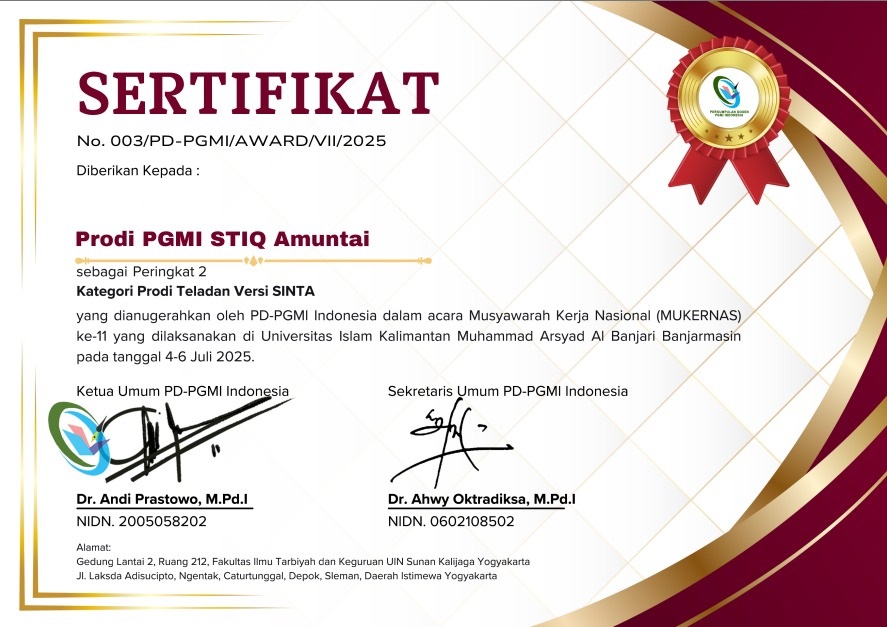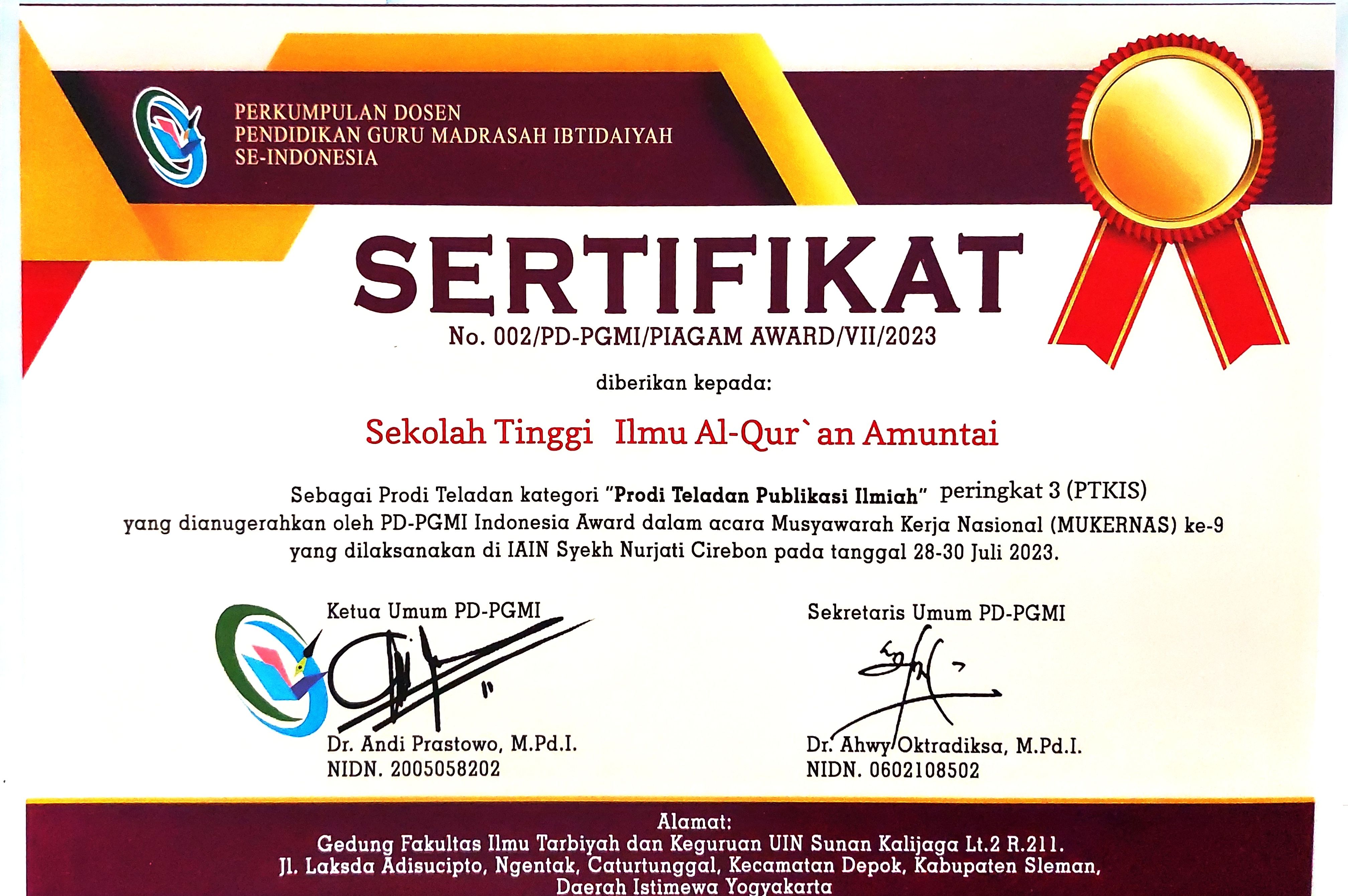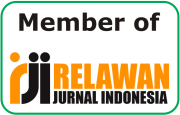An Analysis of Students' Critical Thinking Ability Profile in Mathematics Learning
Abstract
This study aims to analyze the profile of elementary school students' critical thinking ability in mathematics learning and identify differences based on gender. The research was conducted at SDN Pucungkidul 1 Tulungagung, involving 30 fourth- and fifth-grade students selected through purposive random sampling. Data collection was carried out using a critical thinking ability test, which consisted of five indicators: problem interpretation, conceptual analysis, argument evaluation, logical inference, and metacognitive reflection. The data were analyzed quantitatively using descriptive statistics to observe the students' average score trends, and a comparative test was conducted to identify differences based on gender. The findings indicate that the conceptual analysis indicator had the highest score, while metacognitive reflection had the lowest score, suggesting that students still struggle to evaluate their own thinking processes. Additionally, there was a tendency for differences in critical thinking abilities between male and female students, although statistical tests showed varying levels of significance. These findings imply the need for more adaptive and reflective learning strategies to enhance students' critical thinking awareness in mathematics learning.
Keywords
Full Text:
PDFReferences
A Facione, Peter. “Critical Thinking : What It Is and Why It Counts.” Insight Assessment, 2015.
Ahmatika, Deti. “Peningkatan Kemampuan Berpikir Kritis Siswa.” Jurnal Handayani, 2023.
Ardani, and Shinta Hapsari. “Profil Berpikir Kritis Siswa SMP Dalam Memecahkan Masalah Matematika Ditinjau Dari Gaya Kognitif Dan Jenis Kelamin.” MATHEdunesa, 2018.
Barta, Andrea, Liviu Andrei Fodor, Borbala Tamas, and Istvan Szamoskozi. “The Development of Students Critical Thinking Abilities and Dispositions through the Concept Mapping Learning Method A Meta-Analysis.” Educational Research Review, 2022. https://doi.org/10.1016/j.edurev.2022.100481.
Borg, W.R, and M.D Gall. “Educational Research an Introduction Fourth Edition.” Longman Inc, 1983.
Creswell, J W. Research Design: Qualitative, Quantitative, and Mixed Methods Approaches. Edited by 4th. SAGE Publications, 2014.
Darmawan, Siti Muthmainah, and Attin Warmi. “Kemampuan Berpikir Kritis Matematis Siswa Madrasah Aliyah Kelas 12 Pada Materi Statistika.” Jurnal Educatio FKIP UNMA, 2022. https://doi.org/10.31949/educatio.v8i1.1980.
Ennis, R H. The Nature of Critical Thinking: An Outline of Critical Thinking Dispositions and Abilities. University of Illinois, 2011.
Facione, P A. Think Critically. Pearson Education, 2011.
Facione, P.A. “The California Critical Thinking Skills Test - College Level. Experimental Validation and Content Validity.” California Academic Press, 1990.
Field, Andy P. Discovering Statistics Using IBM SPSS Statistics: 5th Edition. SAGE Publications, Inc., 2018.
Fisher, Alec. “Critical Thinking. An Introduction (2nd Ed).” In Critical Thinking. An Introduction (2nd Ed), 2011.
Hafidz, Ahmad Aunil, Widya Kusumaningsih, and Aurora Nur Aini. “Analisis Kemampuan Pemecahan Masalah Matematika Ditinjau Dari Motivasi Belajar Siswa Berdasarkan Gender.” Imajiner: Jurnal Matematika Dan Pendidikan Matematika, 2019. https://doi.org/10.26877/imajiner.v1i6.4867.
Halpern, Diane F. Sex Differences in Cognitive Abilities, Fourth Edition. Sex Differences in Cognitive Abilities, Fourth Edition, 2013. https://doi.org/10.4324/9780203816530.
———. Thought and Knowledge: An Introduction to Critical Thinking, Fifth Edition. Thought and Knowledge: An Introduction to Critical Thinking, Fifth Edition, 2013. https://doi.org/10.4324/9781315885278.
Hayati, Nurul, and Deni Setiawan. “Dampak Rendahnya Kemampuan Berbahasa Dan Bernalar Terhadap Kemampuan Berpikir Kritis Siswa Sekolah Dasar.” Jurnal Basicedu, 2022. https://doi.org/10.31004/basicedu.v6i5.3650.
Hmelo-Silver, Cindy E. “Problem-Based Learning: What and How Do Students Learn?” Educational Psychology Review, 2004. https://doi.org/10.1023/B:EDPR.0000034022.16470.f3.
Hyde, Janet Shibley, and Marcia C. Linn. “Gender Similarities in Mathematics and Science.” Science, 2006. https://doi.org/10.1126/science.1132154.
Ismiati, Denti, Depi Ardian Nugraha, and Muhamad Zulfikar Mansyur. “Pengaruh Gender Dan Gaya Belajar Terhadap Kemampuan Berpikir Kritis Matematik Peserta Didik.” Didactical Mathematics, 2021. https://doi.org/10.31949/dm.v3i1.1448.
Kilpatrick, J., J. Swafford, and B. Findell. Adding It up: Helping Children Learn Mathematics. National Academies Press. Academic Emergency Medicine, 2001.
Mercer, Neil, and Christine Howe. “Explaining the Dialogic Processes of Teaching and Learning: The Value and Potential of Sociocultural Theory.” Learning, Culture and Social Interaction, 2012. https://doi.org/10.1016/j.lcsi.2012.03.001.
OECD. Education at a Glance 2019. Education at a Glance: OECD Indicators, 2019. https://doi.org/10.1787/f8d7880d-en.
Patton, Michael Quinn. “Qualitative Research and Evaluation Methods. Thousand Oaks.” Cal.: Sage Publications, 2002.
Paul, Richard, and Linda Elder. “Critical Thinking: The Nature of Critical and Creative Thought.” Journal of Developmental Education, 2006.
Paul, Richard; Elder, Linda. “The Miniature Guide to Critical Thinking: Concepts & Tools.” The Foundation for Critical Thinking, 2008.
Prasetyo, Nisrina Hani, and Dani Firmansyah. “Analisis Kemampuan Berpikir Kritis Matematis Siswa Kelas VIII Dalam Soal High Order Thinking Skill.” Jurnal Educatio FKIP UNMA, 2022. https://doi.org/10.31949/educatio.v8i1.1958.
Rachmantika, Arfika Riestyan, and Wardono. “Peran Kemampuan Berpikir Kritis Siswa Pada Pembelajaran Matematika Dengan Pemecahan Masalah.” Prosiding Seminar Nasional Matematika, 2019.
Raj, Tilak, Prashant Chauhan, Rashmi Mehrotra, and Meenakshi Sharma. “Importance of Critical Thinking in the Education.” World Journal of English Language, 2022. https://doi.org/10.5430/wjel.v12n3p126.
Ridder, Hans Gerd, Matthew B. Miles, A. Michael Huberman, and Johnny Saldaña. “Qualitative Data Analysis. A Methods Sourcebook.” Zeitschrift Fur Personalforschung, 2014.
Ridwan, Siti Luthfah. “Peningkatan Kemampuan Berpikir Kritis Dan Hasil Belajar Peserta Didik Melalui Model Pembelajaran Discovery Learning.” Jurnal Didaktika Pendidikan Dasar, 2021. https://doi.org/10.26811/didaktika.v5i3.201.
Sangila, Muhammad Syarwa, Sri Anandari Safaria, Iin Rizqy Rahayu, and Asran Asran. “Penalaran Matematis Antara Siswa Laki-Laki Dan Perempuan Yang Bergaya Kognitif Impulsif Dalam Memecahkan Masalah Matematika.” Al-TA’DIB, 2019. https://doi.org/10.31332/atdb.v12i1.1201.
Schoenfeld, Alan H. “Learning To Think Mathematically : Sense-Makingin Mathematics.” In D. Grouws (Ed.), Hand book for Re Searchon Mathemati Cs Tea Chingand Learning. New York: MacMillan., 1992.
Suciono, Wira, Rasto Rasto, and Eeng Ahman. “Analisis Faktor-Faktor Yang Mempengaruhi Keterampilan Berpikir Kritis Siswa Dalam Pembelajaran Ekonomi Era Revolusi 4.0.” SOCIA: Jurnal Ilmu-Ilmu Sosial, 2021. https://doi.org/10.21831/socia.v17i1.32254.
Suganda, Tomy, Parno Parno, and Sunaryono Sunaryono. “Analisis Kemampuan Berpikir Kritis Siswa Topik Gelombang Bunyi Dan Cahaya.” Jurnal Pendidikan Fisika, 2022. https://doi.org/10.24127/jpf.v10i1.4118.
Sugiyono. Metode Penelitian Kuantitatif, Kualitatif, Dan R&D. Alfabeta, 2019.
Vygotsky, L. S. “Interaction between Learning and Development. From: Mind and Society. Cambridge, MA: Harvard University Press.” In Readings on the Development of Children, 1997.
Zubaidah, Siti. “Keterampilan Abad Ke-21: Keterampilan Yang Diajarkan Melalui Pembelajaran. In Seminar Nasional Pendidikan (Vol. 2, No. 2).” Seminar Nasional Pendidikan Dengan Tema “Isu-Isu Strategis Pembelajaran MIPA Abad 21, 2016.
———. “Mengenal 4C: Learning and Innovation Skills Untuk Menghadapi Era Revolusi Industri 4.0 [Introduction to 4C: Learning and Innovation Skills to Face the Industrial Revolution 4.0].” In 2nd Science Education National Conference, 2018.
DOI: http://dx.doi.org/10.35931/am.v9i3.4966
Refbacks
- There are currently no refbacks.
Copyright (c) 2025 Nita Dwi Andayani, Toto Nusantara, Shirly Rizky K., Mardhatillah

This work is licensed under a Creative Commons Attribution 4.0 International License.
Al-Madrasah : Jurnal Ilmiah Pendidikan Madrasah Ibtidaiyah
index by:
Publish by:
Sekolah Tinggi Ilmu Al-Qur'an Amuntai
Contact us:
Address: Jl. Rakha Pakapuran, Amuntai Utara
Kabupaten : Hulu Sungai Utara
Kode Pos : 71471
Provinsi : Kalimantan Selatan
Telephone : 085251613000
Email: madrasahstiq@gmail.com

This work is licensed under a Creative Commons Attribution 4.0 International License.





